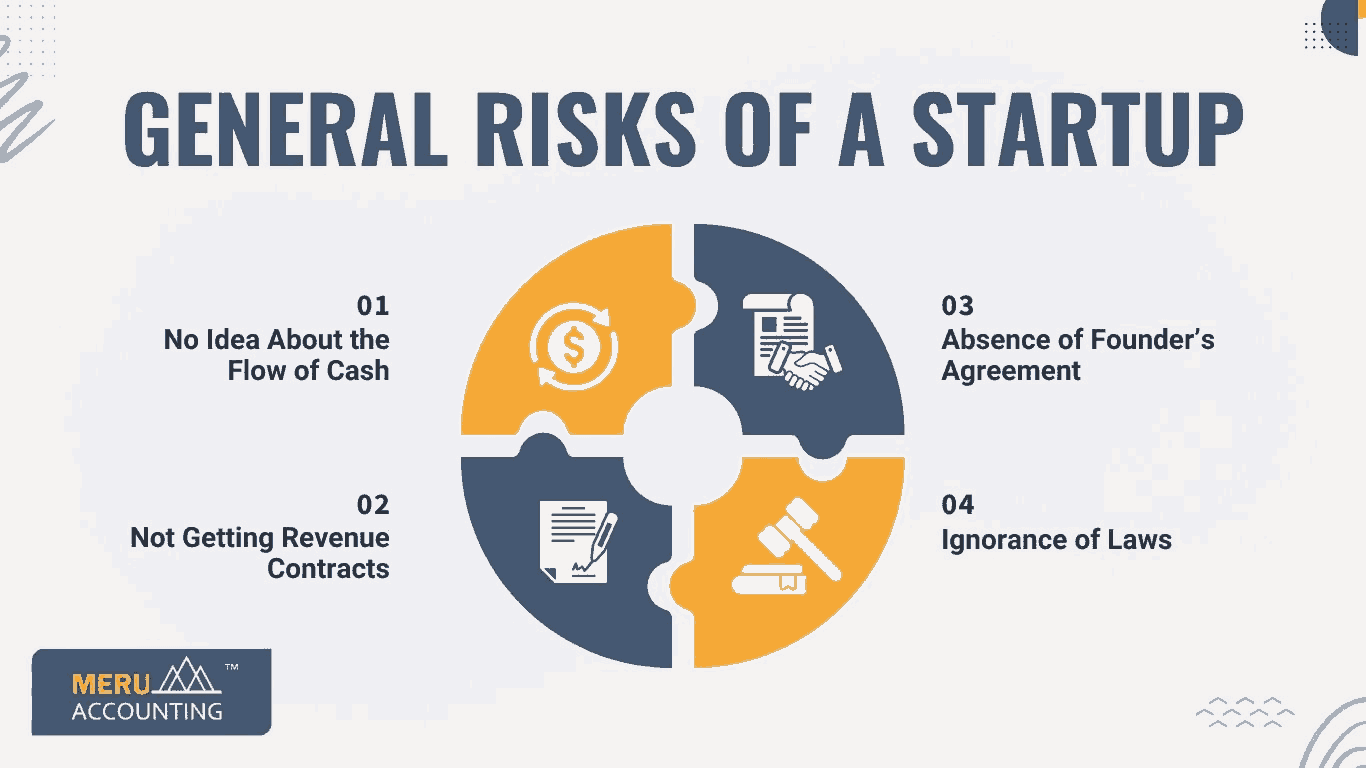
Risks of Startup

Hire A Dedicated Team
That Grows With You, Flexible, Scalable and
Always On Your Side
General Risks of a Startup
-
No idea about the flow of Cash
A business startup requires a enough amount of money as a capital resource. If you don’t manage that capital wisely, the risk of startup failure increases. As an owner, you must know how to use that money effectively and efficiently. The capital that you invest must generate revenue which helps you in an easy flow of the company’s expenditure. You along with your analyst must closely examine the parameters that contribute towards the expenditure of your firm. What is important is that your startup must not always make you invest money regularly.
-
Not getting revenue contracts
Revenue is the lifeline of any business startup. You won’t be able to generate an adequate amount of revenue that is required for an easy run for your company. No new contracts in hand are indeed a matter of concern. This is a common risk of start up operations. Try to have a proper outlook on this matter with your financial experts and invest as per their advice. Secondly, try to figure out what’s the reason behind this sudden drop in the no. of orders. Try to fill up those loopholes.
-
Absence of founder’s agreement
A legal contract is a crucial part of every startup. Every owner of the business firm must know their rights, roles, and responsibilities. Most of the time, every company has its co-founders who have a certain set of jobs to do. This founder’s agreement lays down the work relationships among co-founders. It also plays a major role in solving the disputes arising among the founders. This piece of official document is essential for any business firm. Its absence can badly hit the working procedures of a company. You may resort to this risk by ensuring full legal documentation at the beginning itself.
-
Ignorance of laws
As an entrepreneur, you must follow the laws and guidelines of your firm. You play the role of a leader. You must set an example to ensure that every other worker at your firm follows the guidelines and works effectively. Ignorance of laws creates a setback for your startup. This risk of startup failure can be avoided by compliance from day one.
Every business startup comes with some risks. It depends upon you how well you cope and emerge successfully.
Strategies to Manage Startup Risks
Do Market Research
Know your market well. This cuts down the risk of startup failure. Learn what your customers want. Watch trends. Study your rivals. This helps you shape a strong business idea and avoid costly mistakes.
Make a Clear Business Plan
A simple plan reduces risk. It guides your choices and shows investors you are serious and ready to grow.
Manage Money Wisely
Track what you earn and spend. Watch your cash flow. Create smart budgets. Raise money if needed through loans, crowdfunding, or investors. This keeps your startup running.
Build a Strong Team
Work with skilled people. Choose those with good ideas and real experience. A strong team helps your startup grow and run smoothly.
Add More Ways to Earn
Don’t depend on one product or buyer. Offer more. Sell different things or serve more types of clients. This keeps your income steady, even if the market changes.
Use Smart Tools
Use tech to save time and money. Try tools like cloud accounting, CRM software, or AI to make work easier. These tools help you run your startup better and make smart choices.
Focus on Customer Satisfaction
Offer great products and services. Build strong bonds with your customers. Use customer suggestions to enhance your offerings This creates trust and brings customers back.
Follow the Rules
Not following the law is a major risk of startup failure. Always register your business startup. Get the right permits. Pay taxes on time to avoid fines or legal trouble.
Plan for the Unexpected
Every business startup needs a backup plan. Think ahead. Prepare for slow sales, supply delays, or a weak economy. A backup plan helps your startup stay strong and avoid big losses.
Conclusion
Every opportunity carries some risk. A business startup often faces many hurdles. But with smart strategies, these hurdles can be handled. Good planning, legal support, and sound money choices help lower the risk of failure.
Accounts Junction offers bookkeeping services for startups. These include bookkeeping, cash flow support, and legal compliance. With expert help, startups can avoid common mistakes and stay on track for long-term success.
FAQs
1. How can a startup have a consistent cash flow?
By budgeting smartly, managing expenses, and collecting dues on time, a business startup can maintain a healthy cash flow. Planning helps avoid the risk of startup disruptions.
2. Why is a founder’s agreement necessary?
A founder’s agreement clearly sets the roles, rights, and duties of each co-founder. It helps prevent conflicts. This agreement is important for any business startup because it reduces legal and operational risks.
3. In what ways does Accounts Junction help startups manage cash flow?
Accounts Junction assists startups in monitoring income and expenses to ensure that they have sufficient cash to pay for costs and expand their company smoothly.
4. Is tax filing possible with Accounts Junction for startups?
Yes, Accounts Junction manages tax filings for startups in a way that ensures all their tax returns are filed properly and timely to circumvent penalties.
5. Does Accounts Junction offer financial planning for startups?
Yes. Accounts Junction helps startups create financial plans, set budgets, and make smart money decisions. This support guides them toward long-term success.
6. What if the startups are not making enough revenue?
Startups must analyze their business model, identify vulnerabilities, and try alternative marketing models. Seeking expert consultancy, re-pricing, and expanding customer coverage can also yield more revenue.
Having a job wherein you are your boss is a dream of every aspirant. Youngsters grow up dreaming of working on their terms and conditions and not under someone else's direction. Launching a business startup is an attractive option for many reasons.
You get to learn more. When you take up all responsibilities on your own, it becomes an obvious point to acquire more knowledge. You interact with a wide range of people, learning how to adjust and stay consistently motivated. But every good opportunity comes with some risks. There is no doubt that a business startup is a risk-taking road.
Introduction of Business StartUp
A business startup is a new company that offers a new product or service. Startups are built by people who want fast growth and big changes in the market.
These founders work on new ideas, try to raise money, and aim to stand out from others. Startups can bring great chances, but they also come with big risks.
Common problems include low funds, strong rivals, and the daily work of running a business.
This modern method updates your accounts every day. It helps a business startup stay clear about its finances, avoid errors, and lower the risks of outdated accounting.
Real-Time Accounting Benefits for Startups
Real-time accounting updates your books every day. It helps a business startup stay clear on money, avoid mistakes, and cut down the risk of old, slow methods.
Modern Business Needs
In today’s fast world, real-time money tracking is a must. It helps a business startup lower the risk of startup failure and stay on top of spending.
Access Anytime, Anywhere
Real-time tools let you check your money from anywhere. For a business startup, this helps a lot. Founders can do many jobs at once. You can add data with ease. It stays safe in the cloud and is easy to reach.
No More Delays
Startups can’t wait on old tools. With real-time updates, there are no more long lists or old sheets. One account gives quick and easy access. No stress. No wait.
Know Your Growth
This system also shows how your startup is doing. You get simple reports. They help spot what brings in more money. You can act fast to cut down the risk of startup loss.
Problems with Old Methods
Old tools tell you what went wrong too late. By the time you know, time and money are lost. You also need help to read the data. People can make mistakes. Info can be wrong or lost.
-
Suitable for All Businesses
You may be a trader or run a large business startup, but real-time accounting helps you track financials and spot inefficiencies. It also reduces the risk of startup failure.


Hire A Dedicated Team
That Grows With You, Flexible, Scalable and
Always On Your Side
General Risks of a Startup
-
No idea about the flow of Cash
A business startup requires a enough amount of money as a capital resource. If you don’t manage that capital wisely, the risk of startup failure increases. As an owner, you must know how to use that money effectively and efficiently. The capital that you invest must generate revenue which helps you in an easy flow of the company’s expenditure. You along with your analyst must closely examine the parameters that contribute towards the expenditure of your firm. What is important is that your startup must not always make you invest money regularly.
-
Not getting revenue contracts
Revenue is the lifeline of any business startup. You won’t be able to generate an adequate amount of revenue that is required for an easy run for your company. No new contracts in hand are indeed a matter of concern. This is a common risk of start up operations. Try to have a proper outlook on this matter with your financial experts and invest as per their advice. Secondly, try to figure out what’s the reason behind this sudden drop in the no. of orders. Try to fill up those loopholes.
-
Absence of founder’s agreement
A legal contract is a crucial part of every startup. Every owner of the business firm must know their rights, roles, and responsibilities. Most of the time, every company has its co-founders who have a certain set of jobs to do. This founder’s agreement lays down the work relationships among co-founders. It also plays a major role in solving the disputes arising among the founders. This piece of official document is essential for any business firm. Its absence can badly hit the working procedures of a company. You may resort to this risk by ensuring full legal documentation at the beginning itself.
-
Ignorance of laws
As an entrepreneur, you must follow the laws and guidelines of your firm. You play the role of a leader. You must set an example to ensure that every other worker at your firm follows the guidelines and works effectively. Ignorance of laws creates a setback for your startup. This risk of startup failure can be avoided by compliance from day one.
Every business startup comes with some risks. It depends upon you how well you cope and emerge successfully.
Strategies to Manage Startup Risks
Do Market Research
Know your market well. This cuts down the risk of startup failure. Learn what your customers want. Watch trends. Study your rivals. This helps you shape a strong business idea and avoid costly mistakes.
Make a Clear Business Plan
A simple plan reduces risk. It guides your choices and shows investors you are serious and ready to grow.
Manage Money Wisely
Track what you earn and spend. Watch your cash flow. Create smart budgets. Raise money if needed through loans, crowdfunding, or investors. This keeps your startup running.
Build a Strong Team
Work with skilled people. Choose those with good ideas and real experience. A strong team helps your startup grow and run smoothly.
Add More Ways to Earn
Don’t depend on one product or buyer. Offer more. Sell different things or serve more types of clients. This keeps your income steady, even if the market changes.
Use Smart Tools
Use tech to save time and money. Try tools like cloud accounting, CRM software, or AI to make work easier. These tools help you run your startup better and make smart choices.
Focus on Customer Satisfaction
Offer great products and services. Build strong bonds with your customers. Use customer suggestions to enhance your offerings This creates trust and brings customers back.
Follow the Rules
Not following the law is a major risk of startup failure. Always register your business startup. Get the right permits. Pay taxes on time to avoid fines or legal trouble.
Plan for the Unexpected
Every business startup needs a backup plan. Think ahead. Prepare for slow sales, supply delays, or a weak economy. A backup plan helps your startup stay strong and avoid big losses.
Conclusion
Every opportunity carries some risk. A business startup often faces many hurdles. But with smart strategies, these hurdles can be handled. Good planning, legal support, and sound money choices help lower the risk of failure.
Accounts Junction offers bookkeeping services for startups. These include bookkeeping, cash flow support, and legal compliance. With expert help, startups can avoid common mistakes and stay on track for long-term success.
FAQs
1. How can a startup have a consistent cash flow?
By budgeting smartly, managing expenses, and collecting dues on time, a business startup can maintain a healthy cash flow. Planning helps avoid the risk of startup disruptions.
2. Why is a founder’s agreement necessary?
A founder’s agreement clearly sets the roles, rights, and duties of each co-founder. It helps prevent conflicts. This agreement is important for any business startup because it reduces legal and operational risks.
3. In what ways does Accounts Junction help startups manage cash flow?
Accounts Junction assists startups in monitoring income and expenses to ensure that they have sufficient cash to pay for costs and expand their company smoothly.
4. Is tax filing possible with Accounts Junction for startups?
Yes, Accounts Junction manages tax filings for startups in a way that ensures all their tax returns are filed properly and timely to circumvent penalties.
5. Does Accounts Junction offer financial planning for startups?
Yes. Accounts Junction helps startups create financial plans, set budgets, and make smart money decisions. This support guides them toward long-term success.
6. What if the startups are not making enough revenue?
Startups must analyze their business model, identify vulnerabilities, and try alternative marketing models. Seeking expert consultancy, re-pricing, and expanding customer coverage can also yield more revenue.
